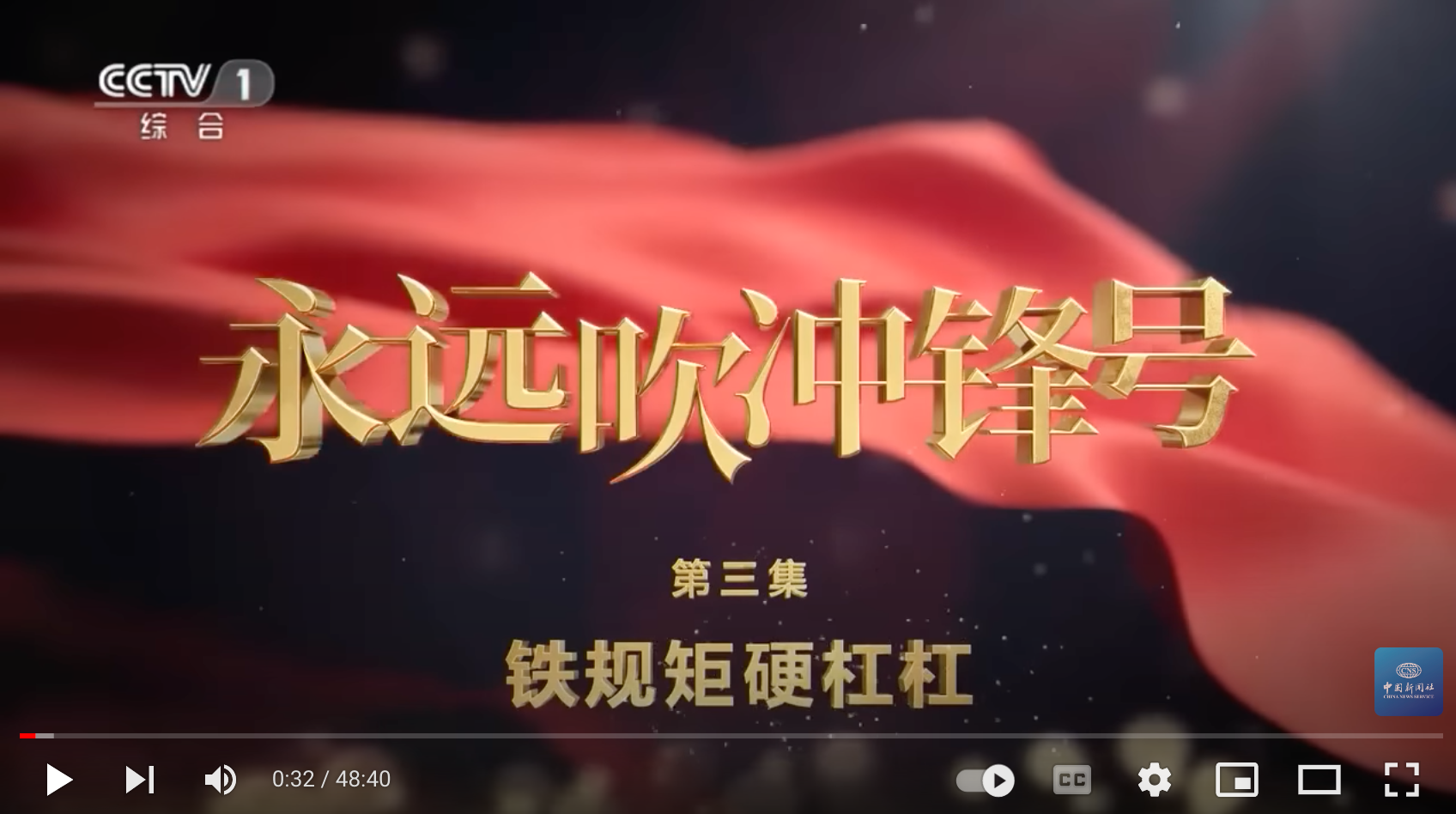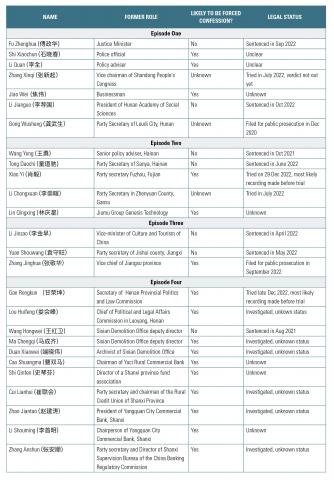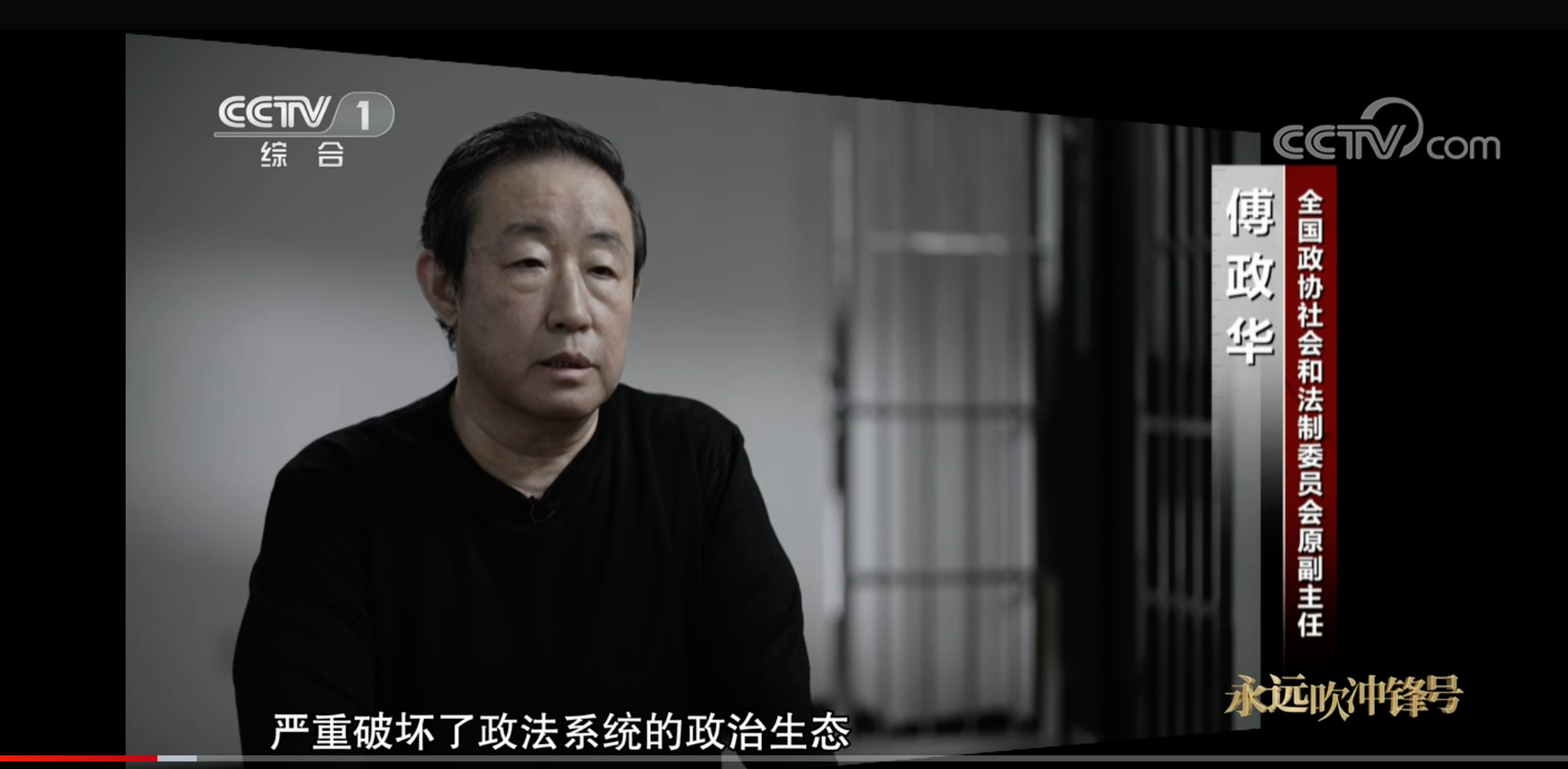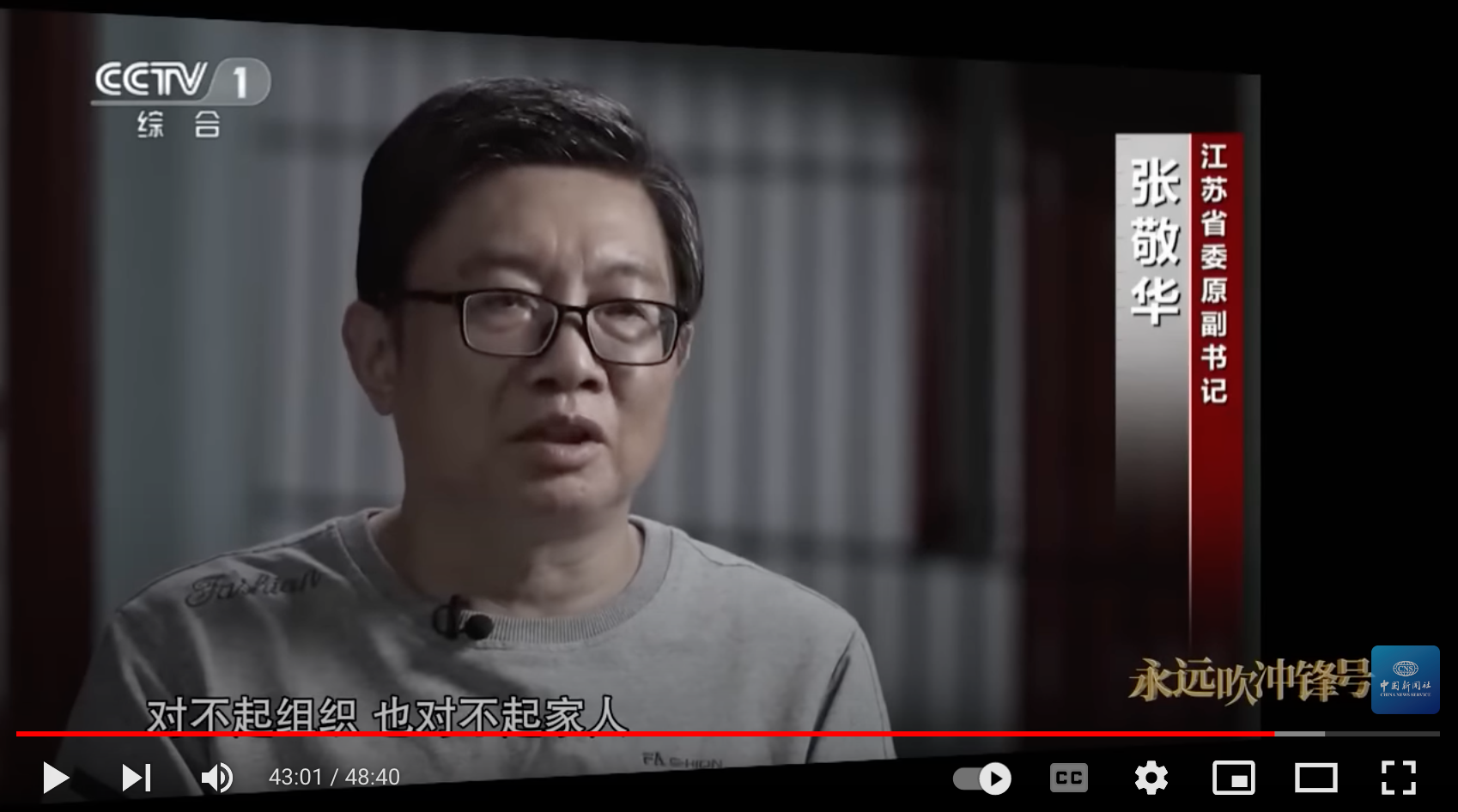China State TV airs 26 confessions in corruption docuseries

CCTV are at it again.
In a recently aired four-part docuseries on China’s state broadcaster CCTV-1 called <<永远吹冲锋号>> (Always Charging Forward), 26 people, some already convicted on corruption charges, but others likely before their trial, are wheeled out on camera to confess their crimes.
The show is produced by the CCP’s Central Commission for Discipline Inspection (CCDI), the feared body in charge of investigating Party members, and CCTV. Each 50-minute episode was aired on CCTV-1 from 7 to 10 January 2023.
Big names, such as Fu Zhenghua (傅政华), the former Justice Minister who was sentenced in September 2022 to life in prison for accepting bribes, are featured on the show. But several others, including Xiao Yi (肖毅), the former Fuzhou city Party secretary whose trial only took place in late December and Zhang Jinghua (张敬华), former vice chief of Jiangsu province, who does not appear to have been tried yet, could be classic forced TV confessions.
What are China’s forced TV confessions?
After Xi Jinping came to power in 2012-2013, CCTV and its global arm CGTN began broadcasting dozens of forced confessions of human rights defenders, foreigners and also non-politically motivated suspects. This was before the confessors had even gone to trial and often before they even had a chance to see a lawyer.
Safeguard Defenders’ groundbreaking 2018 report, Scripted and Staged: Behind the scenes of China’s forced TV confessions analysed the recordings of 45 confessions broadcast between 2013 and 2018 and included interviews with a dozen people who had been victims or members of their families.
This is what we found:
- Confessions are routinely made before trial, before lawyer meetings and often even before formal arrest
- They are by no means real confessions – they are extracted through threats, torture and fear
- Police write the confession script and direct the confessor’s performance
- The confessor is dressed in costume (usually ‘tidied up’ for the camera)
- The confessor has to memorize a confession script or a teleprompter is used
- CCTV cooperated with police, in some cases helping to produce the confession videos
- China’s televised forced confessions violate the right to a fair trial, the presumption of innocence, the right to remain silent, and the right not to self-incriminate.
And often they featured the main confessor – the person or persons around whom the “crime” is centered -- and supporting confessors – the person or persons who played secondary roles in the “crime.”
The part played by the supporting confessor was in fleshing out the details of the crime. Their confession never focused much on themselves, but more on the main confessor.
Confessions on ‘Always Charging Forward’
In total, we counted 26 people confessing in the four-part series.
Many of them had already been tried and sentenced by the time the show was likely recorded and as such they do not officially fit our definition of a forced confession (filmed before trial). However, for 16, or more than half, it is not clear if trial or sentencing has taken place or had taken place at the time of filming, and thus they are all potential forced TV confessions.
Since the CCDI – the CCP’s internal police force -- was a co-producer of the series, most of the confessors would likely at some point have been held in their system for incommunicado and arbitrary detention, Liuzhi. Liuzhi exists outside the legal system. Any judicial process begins only after the CCDI has concluded their investigation, at which point the suspect is placed into regular detention. If any of these confessions were recorded during the CCDI investigation stage, it would not only have been filmed before trial but even before their arrest.
These confessions strongly resemble China’s “traditional” forced TV confessions that Scripted and Staged exposed in detail.
In each episode, we also counted some who appeared to be a main confessor and others who were just supporting confessors.

- Episode One: https://tv.cctv.com/2023/01/07/VIDEDcGVw40bMVNfN1qd2EXk230107.shtml
- Episode Two: https://tv.cctv.com/2023/01/08/VIDEa2k33aGWe4cYVwMDNTay230108.shtml
- Episode Three: https://news.cctv.com/2023/01/10/ARTISpZqHrcSKUING2T69Kii230110.shtml
- Episode Four: https://tv.cctv.com/2023/01/10/VIDERESjynMsTg73FjnFdN6x230110.shtml
The confessors look sombre and contrite. Dressed simply in a dark T-Shirt, they are shown against a black and white background hinting at a jail cell. It is worth noting that they are dressed in civilian clothes and not prison uniforms, which is what they will be wearing once the camera is turned off.

Take “big tiger” Fu Zhenghua, for example. Fu, who is the focus of episode one, is dressed in black, behind him artfully blurred is what looks like the barred door to a jail cell.
Fu’s confession contains some of the classic elements of a forced confession in China:
- Self-criticism
- Confession to being anti-China or anti-Party
- Denouncing others
- Expressions of regret
Speaking in a hoarse whisper and looking frail, the 67-year-old Fu said: “My illegal behaviour badly damaged the Party’s reputation, threatened public security and judiciary…”
“Li Quan did not disclose his true identity and face from the beginning… he made up bigger lies and tempted me step-by-step”

Zhang Jinghua appears in episode three. Since his case was only filed for prosecution last September and there has been no news of his trial since, it is highly likely Zhang’s televised confession for this program violated due process.
Zhang, who wears a grey t-shirt, glasses and similarly appears in front of a background depicting the hazy shadows of bars, looks serious but speaks more strongly than Fu.
“What I regret is my weak sense of law and discipline, I should not have made such a mistake and it was entirely due to my own way of thinking…
“The central government maintains high standards when it comes to good governance and anti-corruption. It was not that I did not know it, I knew it but I did not keep it in my heart.”
“I could not have made it from a teen living in the countryside to a provincial level leader without the help of [the Party] … It was all my own fault. I apologise to the [Party], and I apologise to my family.”
The TV show narrates Zhang’s “crimes” as if he has already been found guilty by a court of law, yet as we can see, Zhang was unlikely to have stood trial when the CCTV camera was pointed at him.
Background to TV show
The show covers 12 corruption-related cases and interviewed CCDI workers, investigators, and other persons involved.
The opening credits features strong Chinese Communist iconography – molten gold is poured into moulds to make a muscular hand gripping a bugle and a hammer and sickle while red silk flutters around representing, presumably, the Chinese flag.
The title, <<永远吹冲锋号>> , is a phrase from Xi's political report to the 20th National Congress, as pointed out by China Media Project’s David Bandurski. The show’s title is thus more accurately translated as Always Charging Forward, a reference to a persistent effort to stamp out official corruption.
In addition to the corruption stories and confessions, the series also contain a significant amount of pro-CCP and pro-Xi Jinping propaganda. The leading minutes of episodes 1 to 3 and the end of episode 4 focus on Xi and the Party. Bandurski believes that the message of the show is less about the pursuit of clean governance and more about signalling loyalty to Xi.
This is not the first China state media docuseries packed with corruption suspects’ confessions. Last year, a five-part show was broadcast by CCTV featuring multiple confessions from officials toppled by corruption charges while in 2016, an eight-part series, Always on the Road, featured dozens of confessions by downed officials.
CCTV1 is carried by, amongst others, France's EUTELSAT, which has already been under scrutiny for the airing of forced TV confessions via CCTV-4 and CGTN recently, especially after CGTN migrated to France as its base for Europe-wide broadcasts after losing its license to air in the UK due to broadcast violations. French TV regulator CSA is being informed about these broadcasts via EUTELSAT.
